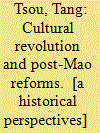| Srl | Item |
| 1 |
ID:
003819


|
|
|
|
|
| Publication |
Chicago, University of Chicago Press, 1986.
|
| Description |
xlv, 351p.hbk
|
| Standard Number |
0226815137
|
|
|
|
|
|
|
|
|
|
|
|
Copies: C:1/I:0,R:0,Q:0
Circulation
| Accession# | Call# | Current Location | Status | Policy | Location |
| 027685 | 951.056/TSO 027685 | Main | On Shelf | General | |
|
|
|
|
| 2 |
ID:
168016


|
|
|
|
|
| Summary/Abstract |
The Chinese People’s Political Consultative Conference (CPPCC) system is a curious institution: often ridiculed as a decorative “flower vase” for the one-Party regime, or, at best, a networking club meant to appease elite groups, it does not attract much scholarly attention. The Communist Party leadership, however, clings adamantly to what it says is a “broadly representative” intermediary body helping with policy reform and United Front work. In this article, we investigate the validity of this original logic with the help of fresh empirical data. We look at the CPPCC’s institutional history, principles of member selection, delegates’ self-conceptualisation, and their modes of operation. Intermediation, it appears, has always been a blurry task for CPPCC members, resulting in a wide array of behavioural choices – from parroting of the Party line to attempts at proactive agenda setting. After more than two decades of relative openness to innovative bottom-up policy proposals, new rules of unified conduct now again stifle the consultative potential of the CPPCCs – but there seems to be some room for intermediary agency left, especially at the local level.
|
|
|
|
|
|
|
|
|
|
|
|
|
|
|
|
| 3 |
ID:
138453


|
|
|
|
|
| Summary/Abstract |
When can non-governmental organisations (NGOs) affect government policies in a strong authoritarian Party-state like China? What is the status quo of state-society relations in China in the new century after decades of reform? Based on the literature of interest groups, state-society relations and civil society, this article builds and tests three hypotheses: the government-guided participation, NGO resource and vertical network. These hypotheses are tested through a quantitative study based on survey data. Findings have shown that the government-guided participation hypothesis is well-supported empirically, while the other two hypotheses have limited corroborating evidence. The Chinese political system is therefore still very much authoritarian and closed after more than two decades of reform and an “associational revolution”. It is also likely to follow a corporatist model instead of a pluralist model of state-society relations.
|
|
|
|
|
|
|
|
|
|
|
|
|
|
|
|